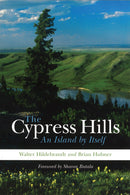Description
With an abundance of buffalo, other game, and lodge pole pine, the hills straddling the Alberta/Saskatchewan/United States border were a natural gathering point for First Nations and Métis peoples. Their presence drew the Hudson Bay Company and American free traders, whiskey traders, and wolfers, resulting in a clash of cultures culminating in the 1873 Cypress Hills massacre, an armed ambush of a Nakoda camp by a group of drunken wolfers and whiskey traders. This event brought the Northwest Mounted Police to maintain peace in the west, and led to the creation of Fort Walsh, today a national historic site. Hildebrandt and Hubner uncover the history, stories, and people to establish a historical narrative of this significant region.
Walter Hildebrandt is known as both a poet and historian. A consultant on Aboriginal treaties, he is co-author of The True Spirit and Original Intent of Treaty 7, which won the Gustavus Myers Award for outstanding work on intolerance in North America in 1997. He is the author of Views From Battleford: Constructed Visions of an Anglo-Canadian West, and The Battle of Batoche: British Small Warfare and the Entrenched Métis.
Brian Hubner has published numerous articles and book reviews, as well as being co-author of two editions of a book of the history and people of the Cypress Hills; The Cypress Hills: The Land and its People (1994) and Cypress Hills: An Island by Itself (2007).


